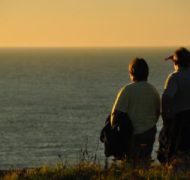Scrutinize Closely How You Are Living
Daily Reflection / Produced by The High Calling
Be very careful, then, how you live—not as unwise but as wise, making the most of every opportunity, because the days are evil.
Ephesians 5:15
When I was in high school, I became enthralled by a statement attributed to the Greek philosopher Socrates. In the Apology, written by Plato, Socrates said, "The unexamined life is not worth living" (38a). In context, this statement formed part of Socrates' unsuccessful attempt to defend himself from the charges that led to his death. I suppose the life and death circumstances surrounding this quotation inspired me. But, most of all, I was in a season of life when I was beginning to think seriously about my identity, future, and purpose.
In fact, I wrote my college application essay based on the idea that "The unexamined life is not worth living." I can't remember everything I wrote in that essay. And, thanks be to God, I don't believe a copy exists to indict me for immature arrogance. But I do remember claiming that I had in fact examined my life. I wrote something like "I know myself" in response to another of Socrates' famous sayings, "Know thyself." I'm embarrassed to admit that, as a 17-year-old, I believed that I really did know myself. And, in retrospect, I'm shocked that the college admissions folk accepted me in spite of my silly self-confidence. But, I expect my essay wasn't the only one to make them smile.
As a senior in high school, I did not realize that I could very well have brought Ephesians 5:15 into my application essay. This verse begins, "Be very careful, then, how you live." A more literal translation of the original Greek might read, "Therefore, scrutinize closely how you are living, not as unwise people but as wise people." Sounds quite a bit like Socrates, doesn't it? This verse doesn't tell us to be careful about how we live so much as it exhorts us to pay close attention to how we're living. It wants us to scrutinize our lives so that we might live more intentionally. Paul could very well have borrowed Socrates' phrasing, urging us to examine our lives.
I need this exhortation. I wouldn't be surprised if you do too. It is so easy for me to live at a quick pace, to speak without thinking, to rush from one thing to another. I can be in "go mode" for days at a time, without stopping long enough to catch my breath, not to mention scrutinize my life. I need, on a regular basis, to stop, to step back, to think, to reflect, to pay attention to how I'm living. I need to think about my choices, my values, my patterns of behavior. I need to look at my life in light of God's intentions for me. Am I living out the calling of God for all of his people (see Eph. 4:1)? Am I living faithfully in the particular calling God has given me? Am I making the most of the time given to me, as will be commended to us in Ephesians 5:16?
If you're a senior in high school, this summer may be a time for you to write your college application essay. You might even want to take a cue from Socrates, though I would recommend against claiming that you really know yourself. I assure you there is much more to be discovered in the years ahead. If you're not a senior in high school, this summer might provide a time of vacation. Perhaps, when you step back from the daily routine and its ceaseless demands, you can take some time to scrutinize your life, to think about how you are living in light of God's gracious and glorious intentions for you.
QUESTIONS FOR FURTHER REFLECTION: How often do you take time to think about how you are living? Do you do this on a regular basis? If so, why? If not, why not? Would it be possible for you to set aside a few hours this summer to think and pray about how you are living? When might you be able to do this?
PRAYER: Thank you, dear Lord, for the exhortation to scrutinize closely how I am living. I find it so easy to rush around like a crazy person, living according to all sorts of expectations and standards, but without really thinking about whether I am living well. Help me, I pray, to take time to examine my life. By your Spirit, show me the truth about how I am living. Help me to be honest with myself and with you, and to begin to make any necessary adjustments. May my whole life be fruitful as I live in faithfulness to your calling. Amen.
______________________________
Risk and Reward
Early in every working life, a special transition occurs before you know how to avoid mistakes, yet after you’ve made them. Like when you first rode a bike without training wheels. You knew enough to be confident, yet too little to avoid losing skin from your knee. The transition is special because it marks a movement from novice to know-how, from apprenticeship to autonomy. Or, as we might say, from young to young professional.
The High Calling recognizes that everyone—moms, accountants, geologists—need vocational growth, so we share past experiences and tell lessons from the future. But what about the early days when we simply got out there and did it?
In the series, Risk and Reward, we ask, “How did I learn so much in so little time?” Join us and be inspired all over again.
Featured image above by Mendhak. Used with Permission. Via Flickr.






